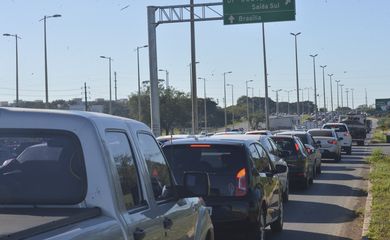Agreements cut pay of 33,000 workers in automotive industry


Due to the drop in sales, automakers slowed down the assembly line's pace. Production fell 19.5% in September, compared with August.

The automotive industry has already signed agreements to have 33,000 workers included on the Employment Protection Program (PPE in the original acronym), in which employees accept to reduce up to 30% of working hours and pays and up to 15% of their salaries shall be paid through the Worker Support Fund (FAT). In exchange, employees cannot be fired.
According to Luiz Moan, President of the National Association for Auto Manufacturers (Anfavea), in some cases, the agreement to include workers on the program was negotiated between companies and unions, but it still needs the approval of the federal government. In addition to the cases of working hours reduction, automakers have 7,200 workers on layoff scheme, that is, to have the contract of employment temporarily suspended.

Luiz Moan, President of the National Association for Auto Manufacturers (Anfavea),
In Moan's view, these measures represent the company's effort not to lay off workers, despite the significant drop in sales. "These figures clearly demonstrate the constant effort of the automotive industry to hold employment to each company's maximum possible rate," reported the Anfavea's president, when announcing Tuesday (Oct. 6), in São Paulo, the industry's report.
Currently companies in the automotive industry employ 133,600 people, 14,100 fewer people than in September last year. Drop in sales reached 32.5%, compared with the 296,300 units sold in September 2014 and the 200,100 cars sold last month. From January to September, 1.95 million vehicles were sold, 22.7% lower than the 2.52 million cars sold in the same period 2014. "We go back to the amount of sales from 2007," said Luis Moan.
Due to the drop in sales, automakers slowed down the assembly line's pace. Production fell 19.5% in September, compared with August. In September, 174,200 units were produced, against 216,600 in August. Compared with the same month in 2014, the drop reported last month reached 42.1%.
One of the segments most affected by the drop in sales was the trucks. Despite the increase of 3.2% in sales between August and September, the 5,800 vehicles licensed last month show a drop of 44%, compared with September 2014. From January to September, the shrinkage is of 47.3%.
A crisis of confidence compounded the effects of the economic activity's slowdown, in Moan's opinion. As an example, he highlighted the drop of 6.8% in sales of agricultural machinery between August and September, going from 4,200 to 3,900 units sold. In the year, the reduction in sales reaches 29.8%, going from 52,500 machines from January to September 2014, to 36,800 for the same period this year.
"At this moment, in my view, there is no reason for such a drop," he said.
Moan noted that agribusiness has had a "positive performance", producing good crops and charging favorable prices due to the devaluation of the real. "We regard much of this decline as factors linked to confidence index, both the consumers' and the investor's [confidence]."
Translated by Amarílis Anchieta
Fonte: Agreements cut pay of 33,000 workers in automotive industry




